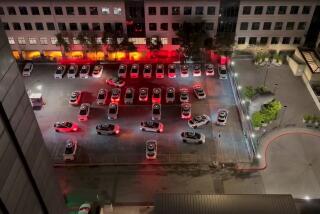One Blaring Problem for Cairo
- Share via
CAIRO — How do they honk? Let us count the ways.
They honk to warn pedestrians to stand back, or to pass another car, or if another car is veering close to them. They toot defensively coming into intersections. They toot while stuck in traffic jams, which is most of the time.
Drivers in this overcrowded city of century-old street mazes and three-abreast traffic down two-lane highways venture forth with their hands on the horn, engulfing Cairo in a never-ending cacophony.
If they drive taxis, they beep for their supper. If they just got married or if their team won the soccer match, they honk from sheer joy--even at 2 a.m. If they want a mango juice or a newspaper, they beckon the street vendor with a friendly honk. Some prefer the horn to headlights, prowling along in the dark without even their dim lights on, tooting away to make others aware of them.
All this honking is deafening, literally.
Constant exposure to street noise has become a source of hearing loss for Cairo’s traffic police and others who are exposed more than seven hours a day, experts warn.
“Cairo is one of the noisiest cities in the whole world,” says Abdel Latif Sharkawy, general secretary of Egypt’s Higher Council for Scientific Research, summarizing the findings of a four-year study.
Take, for example, Dokki Square in the Giza suburb just down the road from the famed pyramids.
In all of blaring greater Cairo, scientists have identified Dokki Square as the loudest location--and that is saying something.
Six streets converge there, and the vibrations of the elevated steel roadway built to relieve traffic congestion (it doesn’t) magnify the noise.
*
Microphones at mosques shout out the call to prayer five times a day, the singsong mingling with the din from crammed apartment blocks and open-front shops where Cairenes argue, haggle and play. And, of course, there’s the honking.
The average decibel level? Around 105. More than 80 is considered dangerous to human hearing.
The noise has been linked to stress, high blood pressure and even delayed reactions, Sharkawy says. People become inured to all that sound, so their nervous systems do not respond fast enough when they need to jump out of the way.
“The only solution is getting the people out of the city,” offers Mahmoud Kasim, a visitor from the Nile Delta city of Alexandria, shouting to be heard over the commotion.
Other suggestions include moving government buildings out of Cairo, limiting donkey carts and trucks to certain hours and making better use of the Nile for transportation. Another idea is to require horn circuit breakers that would permit just one toot at a time.
But there is no sign of any serious steps to dampen the din.
Sharkawy’s findings were handed to traffic authorities two years ago: “I think they are going to form a committee.”
The horn-blowing habit has gotten so bad, he says, that “a person will cross the street without even looking, and then he will expect you to blow the horn to warn him.”
Alive, Cairo’s magazine for wannabe hipsters, had the idea of challenging taxi drivers to go from the Ramses train station in central Cairo to suburban Maadi--12 miles--without honking. A prize of 10 Egyptian pounds, or nearly $3, was offered on top of the normal 10-pound fare.
Depending on traffic, the journey can take half an hour or an hour and a half. Driver Samir Shawky, 22, lasted 13 honkless seconds.
“Asking someone to drive without using the horn is like asking someone to lay an egg,” he complained, then proceeded to use his horn 14 times in the next minute.
Ahmed Gamael Din, 36, was in his 18th minute when he lost the bet.
“I had to hit it; otherwise we’d have had an accident,” he told the magazine. “Does that count?”
The one driver who managed to go the distance credited self-discipline and nerves of steel.
“I couldn’t have done it without my cigarettes,” 27-year-old Sayed Gamal said.
On paper, Egypt’s traffic laws ban using the horn except in emergencies. But the statute is never enforced.
“For every person, you’d need another traffic policeman,” Sharkawy says.
Cairo has an estimated 15 million inhabitants, and every day another 2 million people pour in from the countryside to work or trade and then go home again.
The city has more than 1 million registered vehicles, not to mention uncounted bicycles, donkey carts, horse-drawn carriages, wheelchairs and the occasional herd of goats or camels vying for the pavement. Sidewalks, where they exist, are often blocked, forcing the millions of pedestrians to use the street.
*
Most traffic patterns (a charitable description) are unchanged from designs of a century ago, before the automobile, Dr. Mohammed Hasan Ramzy wrote recently in the newspaper Al Ahram.
In most of the world there is a fixed rush hour, he noted, but in Cairo activities are so haphazard that the main streets are crowded all day long and well into the evening.
The noise level at 3 a.m. in Dokki Square is not much less than at midday, scientists found. And the noisiest time of the week is one hour after prayers on Fridays, purportedly the local day of rest.
Horn use and abuse have one “up” note--they are a boon for the shops that sell horns.
One proprietor, Fathi Abdel Ghafar, reports that his customers all want something stronger and louder to blast. “Especially taxi drivers--they change their horns almost every three months.”
Novelty is important for making one’s honk rise above the fray.
“The latest craze is a crying-baby sound,” Ghafar says. “And there is one that makes different animal sounds, like cows mooing or dogs that bark.”
Some, like taxi driver Taha Aly, 34, disdain the honking, or pretend to.
“It’s noisy, and it offends me,” he said. “So I don’t do it unless I really have to.”
Just then, he tooted at a gaggle of chattering students walking between parked cars.
Looking up sheepishly, he said, “It’s a very narrow street, and I have to make them notice that I’m coming.”
More to Read
Sign up for Essential California
The most important California stories and recommendations in your inbox every morning.
You may occasionally receive promotional content from the Los Angeles Times.













